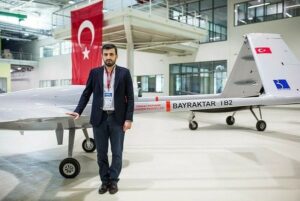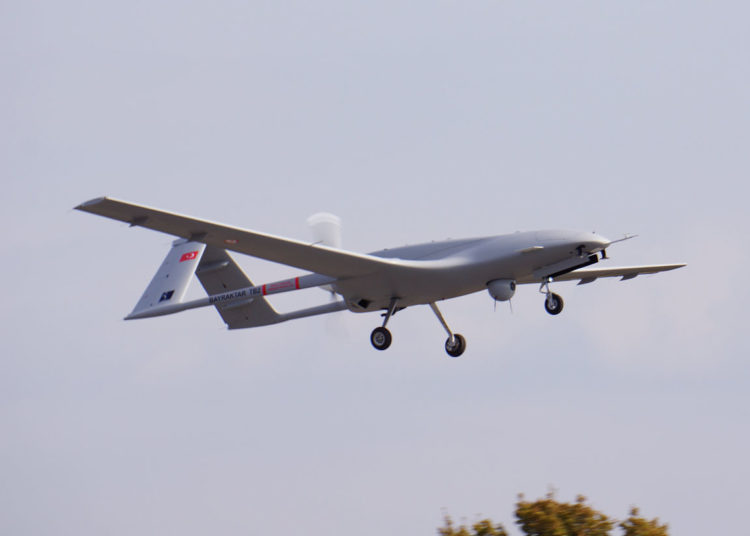Abdullah Bozkurt/Stockholm
In a cache of documents submitted to the UN Security Council, Russia accused Turkish drone manufacturer Baykar Makina of involvement in a plot to equip its drones with chemical and biological warfare capabilities at the request of Ukraine, an accusation that was denied by Turkey.
Delivering a statement at the UN Security Council in March 2022, Russia’s Permanent Representative to the UN Vassily Nebenzia said Russian authorities intercepted documents from Baykar Makina, the manufacturer of Bayraktar drones, that suggested Ukraine wanted to convert drones into a delivery mechanism for deadly airborne agents.
“The documents indicate that the Kiev regime attempted to get access to technical opportunities for delivery of hazardous biological agents by air. Last year Ukraine sent a request to the Turkish manufacturer of UAVs Baykar Makina regarding the possibility of equipping the Bayraktar drones with equipment enabling them to spray more than 20 liters of aerosol while flying for more than 300 kilometers,” Nebenzia said. “If equipped with such aerosol system and having 300-kilometer flight range, such a drone will pose a real threat of spraying hazardous biological aerosols over the territory of Russia.”
A copy of the letter sent to Baykar Makina by Ukrainian authorities and the response from the Turkish manufacturer were provided to members of the UN Security Council on April 19, 2022.
Intercepted letter from Baykar to Ukraine:
If the allegations are correct, Turkey as well as Ukraine are in violation of the Convention on the Prohibition of the Development, Production and Stockpiling of Bacteriological (Biological) and Toxin Weapons and on Their Destruction (BWC) in addition to a number of other international treaties that ban the use of such weapons.
Turkey did not respond to the Russian allegations until September 7, when Turkey finally submitted a written statement saying that Turkey has been a party to BWC since 1974 and fulfills all its obligations stemming from the convention.
“The said unmanned aerial vehicle produced in Türkiye is only used for airborne reconnaissance, surveillance and target elimination requirements. Its technical specifications do not include any system or mechanism that can be used as biological weapons,” the statement said.
Turkey’s response to the UN on the Russian accusations:
Bayraktar drones are manufactured by the Istanbul-based defense contractor Baykar Makina Sanayi ve Ticaret Anonim Şirketi (Baykar), which is run by President Recep Tayyip Erdoğan’s son-in-law Selçuk Bayraktar. The company has landed major contracts with the Turkish government as well as with foreign countries because of the considerable support it receives from Erdoğan, who lobbies for the sale of drones to the Turkish Armed Forces as well to other countries.
Customers that have taken delivery of Bayraktar armed drones are Ukraine, Poland, Qatar, Libya, Kyrgyzstan, Kazakhstan, Ethiopia and Azerbaijan, with more countries expressing interest in purchasing them.

According to the letter obtained by Russia, the State Expert Control Service of Ukraine submitted a series of questions to Baykar about the capabilities of Bayraktar drones. Most questions were standard, but two of them stood out, which according to Russian officials raised the possibility of the introduction of biological warfare using drones. The questions Ukraine was asking focused on the maximum payload and aerosol spray system and mechanism. “Is the UAV equipped [with] a system/mechanism for spraying aerosols with a capacity of more than 20 liters?” question number nine asked.
“It can be assumed that the Bayraktars were planned to be adapted for spraying chemical warfare agents over enemy territory, more precisely in its deep rear, because the flight range of this UAV (Bayraktar Akinci) is almost 300 kilometers (twice as long as that of the standard TB2),” Russia said in a letter to the UN.
Russian letter to the UNSC detailing the accusations:
Russia claims it has more evidence to support the allegations that Ukraine may resort to such warfare.
“It is a matter of concern that, on 9 March, three unmanned aerial vehicles equipped with 30-litre containers and equipment for spraying formulations were discovered in Kherson province by the reconnaissance units of Russian troops. In January 2022, Ukraine reportedly purchased, through intermediary organizations, more than 50 such devices that can be used to apply biological formulations and toxic chemicals,” said the Russian permanent representative to the UN.
There has been no independent verification of Russia’s allegations with respect to Turkey, but strangely enough the issue has never been covered by the Turkish media, which is almost entirely controlled by the Erdoğan regime. Although both the US and Ukraine, also accused by Russia of violating UN conventions on the prohibition of biological and chemical weapons, were quick to respond to the Russian allegations, Turkey kept silent for months.
The Turkish government’s response was issued just before a UN meeting on the implementation of the BWC in Geneva in late August and early September. In the response, Ankara also revealed that it has an active biological warfare program which it described as being for peaceful purposes and “to develop capacities in countering the biological threats and pandemics.” The program, which Turkey said was in line with the BWC, continues with the participation of other countries in exchange for equipment, materials and information for this purpose.
The Russian permanent representative’s remarks at the UN Security Council:












